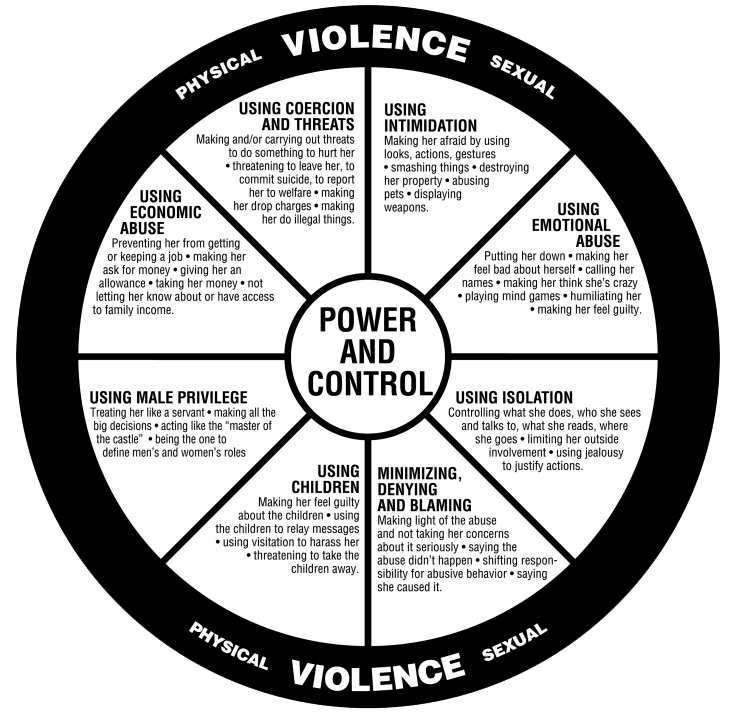Signs Of Abuse
National Domestic Violence Hotline
Just because the abuse isn't physical, doesn't mean that it's any less damaging."
At the start of a new relationship, it’s not always easy to tell if it will later become abusive. In fact, many abusive people appear like ideal partners in the early stages of a relationship. Possessive and controlling behaviors don’t always appear overnight and may emerge and intensify as the relationship grows.
Every relationship is different and domestic violence doesn’t always look the same. One feature shared by most abusive relationships is that the abusive partner tries to establish or gain power and control through many different methods, at different moments.
If You Have Any Emergencies Call 911 Immediately
- Name-calling. They’ll blatantly call you “stupid,” “a loser,” or words too awful to repeat here.
- Derogatory “pet names.” This is just more name-calling in not-so-subtle disguise. “My little knuckle dragger” or “My chubby pumpkin” aren’t terms of endearment.
- Character assassination. This usually involves the word “always.” You’re always late, wrong, screwing up, disagreeable, and so on. Basically, they say you’re not a good person.
- Yelling. Yelling, screaming, and swearing are meant to intimidate and make you feel small and inconsequential. It might be accompanied by fist-pounding or throwing things.
- Patronizing. “Aw, sweetie, I know you try, but this is just beyond your understanding.”
- Public embarrassment. They pick fights, expose your secrets, or make fun of your shortcomings in public.
- Dismissiveness. You tell them about something that’s important to you and they say it’s nothing. Body language like eye-rolling, smirking, headshaking, and sighing help convey the same message.
- “Joking.” The jokes might have a grain of truth to them or be a complete fabrication. Either way, they make you look foolish.
- Sarcasm. Often just a dig in disguise. When you object, they claim to have been teasing and tell you to stop taking everything so seriously.
- Insults of your appearance. They tell you, just before you go out, that your hair is ugly or your outfit is clownish.
- Belittling your accomplishments. Your abuser might tell you that your achievements mean nothing, or they may even claim responsibility for your success.
- Put-downs of your interests. They might tell you that your hobby is a childish waste of time or you’re out of your league when you play sports. Really, it’s that they’d rather you not participate in activities without them.
- Pushing your buttons. Once your abuser knows about something that annoys you, they’ll bring it up or do it every chance they get.
- Jealousy. They accuse you of flirting or cheating on them.
- Turning the tables. They say you cause their rage and control issues by being such a pain.
- Denying something you know is true. An abuser will deny that an argument or even an agreement took place. This is called gaslighting. It’s meant to make you question your own memory and sanity.
- Using guilt. They might say something like, “You owe me this. Look at all I’ve done for you,” in an attempt to get their way.
- Goading then blaming. Abusers know just how to upset you. But once the trouble starts, it’s your fault for creating it.
- Denying their abuse. When you complain about their attacks, abusers will deny it, seemingly bewildered at the very thought of it.
- Accusing you of abuse. They say you’re the one who has anger and control issues and they’re the helpless victim.
- Trivializing. When you want to talk about your hurt feelings, they accuse you of overreacting and making mountains out of molehills.
- Saying you have no sense of humor. Abusers make personal jokes about you. If you object, they’ll tell you to lighten up.
- Blaming you for their problems. Whatever’s wrong in their life is all your fault. You’re not supportive enough, didn’t do enough, or stuck your nose where it didn’t belong.
- Destroying and denying. They might crack your cell phone screen or “lose” your car keys, then deny it.
- Demanding respect. No perceived slight will go unpunished, and you’re expected to defer to them. But it’s a one-way street.
- Shutting down communication. They’ll ignore your attempts at conversation in person, by text, or by phone.
- Dehumanizing you. They’ll look away when you’re talking or stare at something else when they speak to you.
- Keeping you from socializing. Whenever you have plans to go out, they come up with a distraction or beg you not to go.
- Trying to come between you and your family. They’ll tell family members that you don’t want to see them or make excuses why you can’t attend family functions.
- Withholding affection. They won’t touch you, not even to hold your hand or pat you on the shoulder. They may refuse sexual relations to punish you or to get you to do something.
- Tuning you out. They’ll wave you off, change the subject, or just plain ignore you when you want to talk about your relationship.
- Actively working to turn others against you. They’ll tell co-workers, friends, and even your family that you’re unstable and prone to hysterics.
- Calling you needy. When you’re really down and out and reach out for support, they’ll tell you you’re too needy or the world can’t stop turning for your little problems.
- Interrupting. You’re on the phone or texting and they get in your face to let you know your attention should be on them.
- Indifference. They see you hurt or crying and do nothing.
- Disputing your feelings. Whatever you feel, they’ll say you’re wrong to feel that way or that’s not really what you feel at all.
If you’re being mentally and emotionally abused, trust your instincts. Know that it isn’t right and you don’t have to live this way.
If you fear immediate physical violence, call 911 or your local emergency services.
If you aren’t in immediate danger and you need to talk or find someplace to go, call the National Domestic Abuse Hotline at 800-799-7233.
This 24/7 hotline can put you in touch with service providers and shelters across the United States.
- Accept that the abuse isn’t your responsibility. Don’t try to reason with your abuser. You may want to help, but it’s unlikely they’ll break this pattern of behavior without professional counseling. That’s their responsibility.
- Disengage and set personal boundaries. Decide that you won’t respond to abuse or get sucked into arguments. Stick to it. Limit exposure to the abuser as much as you can.
- Exit the relationship or circumstance. If possible, cut all ties. Make it clear that it’s over and don’t look back. You might also want to find a therapist who can show you a healthy way to move forward
- Give yourself time to heal. Reach out to supportive friends and family members. If you’re in school, talk to a teacher or guidance counselor. If you think it will help, find a therapist who can help you in your recovery.
Leaving the relationship is more complex if you’re married, have children, or have commingled assets. If that’s your situation, seek legal assistance. Here are a few other resources:
- Break the Cycle: Supporting young people between 12 and 24 to build healthy relationships and create an abuse-free culture.
- DomesticShelters.org: Educational information, hotline, and searchable database of services in your area.
- Love Is Respect (National Dating Abuse Hotline): Giving teens and young adults a chance to chat online, call, or text with advocates.


